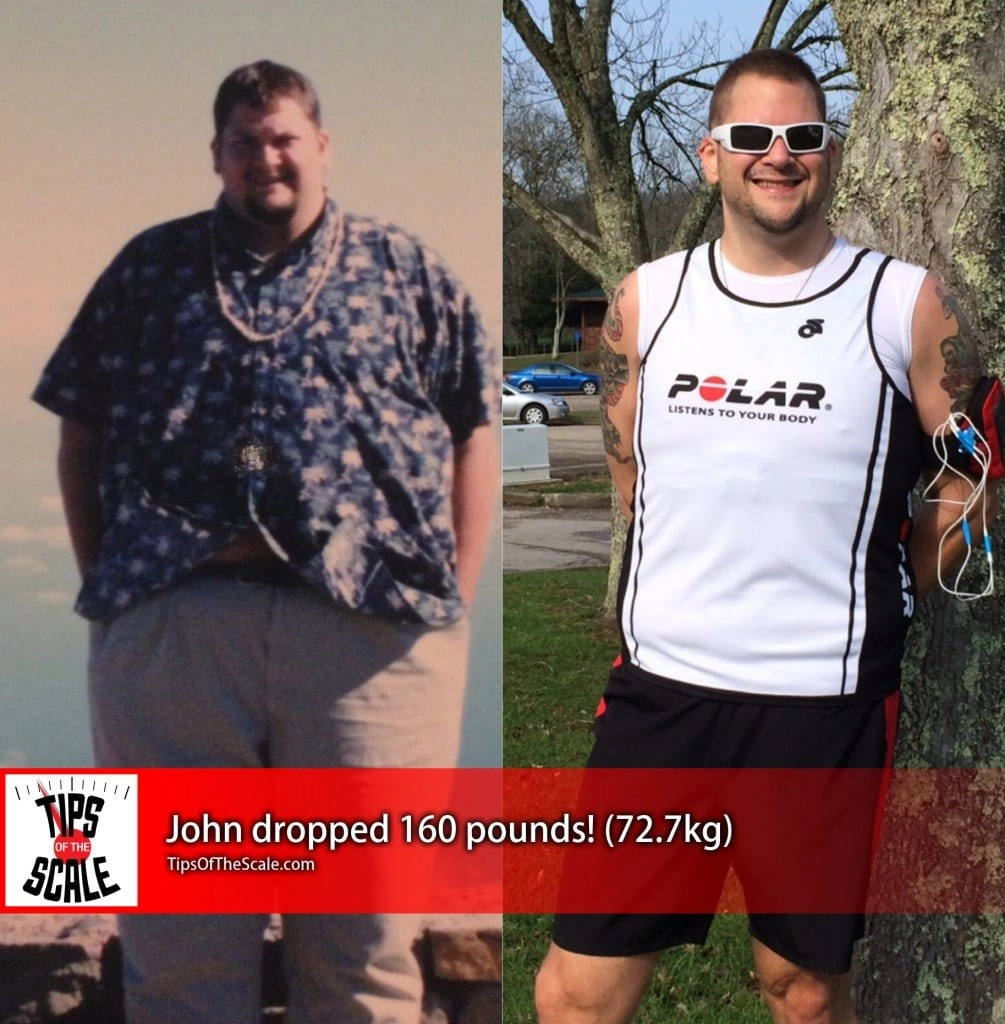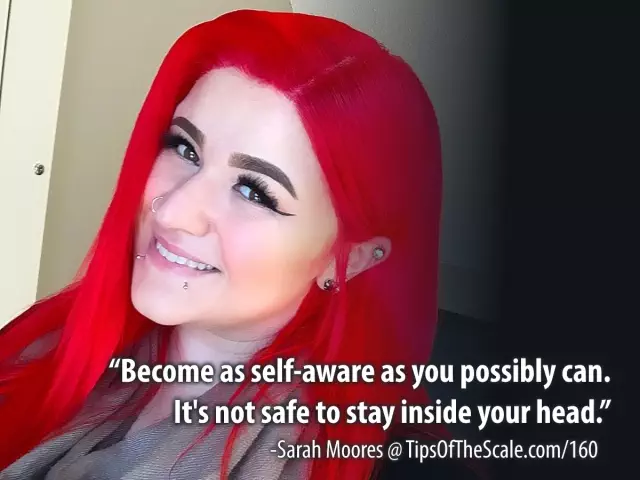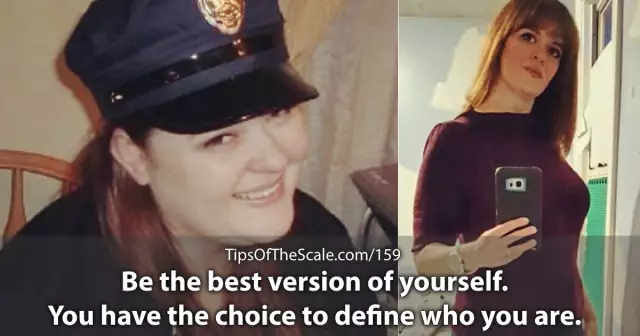John Hudson was a “ticking time bomb” waiting for a heart attack.
When a patient turned his health advice around on him, John realized that his credibility, health and life were all on the line.
“Weight loss is not a race.”
Weight Gain Background and Contributing Factors
John had been obese his whole life, beginning around age 5 or 6, and he recalls that his parents didn’t know how to provide him with a nutritionally balanced diet.
“Never known what it was like to be thin or fit.”
John’s parents divorced when he was 10, and he used food as a coping mechanism. The over-eating led to depression, which led to more eating, and by the sixth grade, John was 5’9” and weighed 235 pounds. (106.8 kg)
How Being Overweight Impacted John’s Life
John spent most of his time studying, doing homework, and doing things with a group of friends. However, he shares that his weight and confidence issues kept him from participating in sports he was interested in, which reduced his level of activity.
In the middle of this, John didn’t see himself as fat until he became a teenager. As social developments and teenage romantic interest developed, he became much more aware of his body image. He recalls that the way he viewed himself grew more and more negative.
“I’m really fat, I’m really ugly… this is not good.”
John tried many diets, and even had a 100-pound temporary success with Atkins at one point, but in hindsight realizes that many of them were structured in ways he just couldn’t maintain in the long-term.
John reached a peak weight of 410 pounds. (186.4 kg) It would be years before he entered pharmacy school and began learning about nutrition.
The Turning Point
John describes being an emotionally wreck, trying to find clothes that fit, trying to fit in with everyone, starting a new professional job.
He had knee problems, back problems, and sciatic nerve pain that made his legs and feet go numb. He knew that his family has a history of obesity-related diseases, and became increasingly concerned about how he was going to handle being on his feet all day as a pharmacist.
In the Fall of 2011, John was close to his heaviest (recorded) weight and was a diabetic. His doctor did an A1C test (3-month average of blood-glucose levels) and his result came back as 3x the normal. He had high blood pressure bordering on stroke levels and was already taking two medications for blood pressure. Had high triglycerides.
“I was a ticking time bomb, waiting for a heart attack.”
John found himself, at 37, about to begin diabetic injections and soon to start a new hypertension medication as well.
One day John was counseling a diabetic patient, and found himself telling the patient to watch their diet and reduce sugar intake. While saying this, John noticed the patient glancing over at the soda, chips, and candy bar that John had on his counter.
The patient was defensive, and took the opportunity to give John a piece of their mind.
“You really have some nerve telling me that I need to eat better, exercise and lose some weight. Look at you, you could stand to lose some weight yourself. You’ve got that Coke and candy bar right there just staring at me. You’re a total hypocrite.”
John was devastated, but felt the sting of truth in the patient’s remarks.
“He was right, he was absolutely right… I knew right then that I had to get healthy to be a credible health care provider to my patients.”
That conversation, in addition to his recent lab work and worsening health condition, were the breaking points.
Starting The Weight Loss Journey
At first, John started the same way he had started previous attempts. He joined a gym, created a few meal plans, and did well for a short period before noticing that he was veering off his plan.
This was when John first realized he was dealing with emotional eating. Although he knew about nutrition and health, he now understood that something else going on, and he sought out a therapist (with a specialty in food addiction) to help to handle it.
“I believe that most people have some sort of addictive nature to something. For me, it was food, more specifically, comfort food.”
He worked to examine his food addiction, his relationship with food, and learned how to change those thoughts. He become more aware of when he was making “deals” with himself to justify snacks or indulging.
He also learned that an all or nothing approach will not work for him. He’s had to find a happy medium and allow himself to make occasional mistakes without being too hard on himself. Football games and tailgate parties are one example where he is careful and focuses on doing better than he has in the past.
Staying Motivated
John describes how important exercise has been for his attitude, energy level, and overall well-being.
“Exercise is the best medicine for feeling good and feeling better and just living a good life.”
John also went public to seek out the help and support he needed. He started a Facebook page and says it was one of the best decisions he’s made.
“So good to connect to other people going through the same thing as I am, going through the same struggles as me.”
“It’s so key to have a very good support network available to you, whether it is friends and family in person or friends online or a group online.”
In order to avoid his OCD-like behavior where the scale is concerned, he’s limited himself to weighing-in only once a week to ensure nothing is out of kilter.
“I don’t get caught up in the number as much now… It is not a specific indicator of how you are doing health-wise.”
What John Learned About Food, Exercise, and Himself
John has taken lessons learned from every past failed diet attempt, and now realizes that there isn’t one perfect way that works for everyone.
Because of the emotional aspect of his original eating habits, John has been especially careful to avoid being compulsive about weighing himself.
“Your body weight can fluctuate so rapidly with water and sodium intake that you may go up a pound, but that may be water retention.”
John tries to eat healthier foods and whole foods, like fruits and vegetables, lean foods. He also tries to time foods to a certain part of the day; for instance: carbs in the early part of the day to support his energy level and activity for the day.
He’s also started planning out his diet to provide structure, which removed his unknown “what am I going to eat” and the opportunity to get off track. He does acknowledge the need to be flexible so he can still be social and enjoy food.
“You cannot be 100% on and 0% off. You have to find a happy medium. Enjoy food, but still stay on track.”
John’s Advice For Your Journey
Don’t let one lapse or misstep on your plan throw you off your path. One instance (or cheat) does not define you as a person. If you work to be a healthy person overall, one week of not losing weight is not something to stress out about.
“Leave the past where its at… The only thing you can do with the past is learn from it.”
Be honest with yourself and realistic about the changes you make:
“If you want to see success, you have to do something that’s going to work over a lifetime.”
You gotta make sure that you have the strong desire within yourself to do it, to do the hard work because “if you don’t have that desire, you’re not going to be successful. Without the desire, you’re not going to seek out the education that you will need to do to educate yourself.”
Education is very important as is a good support system.
“Believe in yourself and don’t be afraid.”
Resources Discussed In This Podcast
- The Beck Diet Solution by Dr. Judith Beck [ Amazon / iTunes Audiobook ]
- Shrink Yourself: Break Free From Emotional Eating Forever by Dr. Roger Gould [ Amazon / iTunes ]
- MyFitnessPal app
- Fooducate app [ Android / iPhone ]
On John’s Workout Playlist
- C’mon (Catch ‘Em By Surprise) by Tiësto & Diplo [ Amazon / iTunes ]
- Let It Go (dance version) by Idina Menzel [ Amazon / iTunes ]
Contacting John
Visit John’s Facebook community and share your thoughts! You can also email him here.






You must be logged in to view comments.